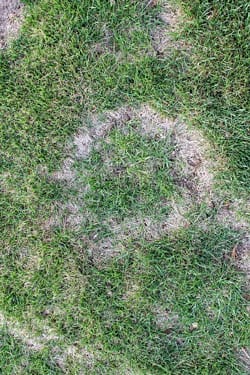HOAs act on difficult grass disease

This area of necrotic ring spot in a BrambleRidge yard shows the typical circle pattern of dead grass caused by a fungus that is hard to treat. The BrambleRidge HOA will treat 22 yards in that subdivision this spring and fall. Ring Spot is common in Colorado and has been the subject of many studies by CSU scientists.
Article and photo by Steve Baska
Necrotic ring spot is a stubborn lawn fungus disease that is affecting some areas of Castle Pines, and has spurred the city’s two homeowner associations that provide lawn maintenance to their homeowners to take action.
BrambleRidge Village Patio Homes on the north side of Castle Pines along Monarch, has about 75 percent of its homes affected by the condition, which appears as circles of dead grass. The BrambleRidge board decided last month to treat 22 of its lawns (those with the most disease) this spring and fall and to monitor the success because there is no known cure, they said. “We will try it and see what happens,” said HOA President Steve Konecny. A product recommended by Colorado State University (CSU) will be used.
BristleCone Patio HOA, on the north side of Castle Pines Parkway just west of Timber Trail Elementary School, had about a dozen lawns affected and treated them with success over the last two years, said HOA President Ted Lohr. “An arborist told us of a fertilizer he used for purple leaf plumb tree blight, and this chemical just happened to also improve lawn spot, so we tried it and our lawns now look great,” he said.
That treatment was about $150 per home for one treatment, but the chemical that BrambleRidge will try is less expensive (an exact cost was not available). The lower cost was important to BrambleRidge because its residents asked the HOA board to avoid any dues increase or special assessments for this lawn treatment.
An e-mail to BrambleRidge residents from its management company recently stated, “The experts can’t agree on how (ring spot) is transmitted. CSU scientists say it’s a root-born fungus that is not transmitted by lawn maintenance equipment, while other experts say it is transmitted by lawn maintenance equipment.” A former BrambleRidge board member who has studied the condition said it affects only Kentucky bluegrass. Improvement is possible with overseeding with Rye grass or fungus-resistant bluegrass, he said.
BristleCone and BrambleRidge are the only two HOAs in Castle Pines that provide lawn maintenance to their homeowners, Lohr said. Other places in the Castle Pines area may have lawn spot, but the homeowners provide their own lawn care. Other local HOA officials said they were not aware of ring spot in their subdivisions.
To contact local HOAs for more information, visit http://
cpnhoa.org/Neighborhood_HOA.